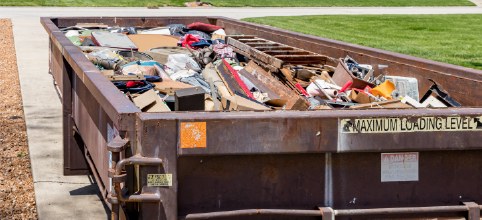
Updated March 13, 2023
Whether you’re emptying an old shed or you’re a demolition company needing to dispose of debris, renting a dumpster is a great tool to simplify your project.
Before committing to a service provider, make sure you understand exactly what a dumpster rental quote entails so that you are not blindsided on the day your final bill arrives.
The first step when renting a dumpster is to call dumpster rental companies in your area for quotes. (We recommend getting several.)
Getting a dumpster rental quote is typically done over the phone or internet and is based on a variety of factors.
In this article, we’ll discuss...
- Gathering information before getting quotes
- Different types of dumpster rental companies
- What’s included in a quote
- Factors that affect the final price
Find a dumpster rental company in your area
Gathering Information Before Getting Quotes
To get the most accurate quote, you’ll need to provide information regarding your project.
Before you start shopping around, know the specifics of these project details:
- Project site address
- Type of debris
- Amount of debris
- Where on the property you’d like the dumpster dropped off (driveway, sidewalk, road, etc.)
- The date you need the dumpster
- How long you need the rental
Different Types of Dumpster Rental Companies
The type of dumpster rental service you use can make a huge difference not only in the final price you pay, but in the overall quality of service you receive.
There are 3 types of dumpster rental companies...
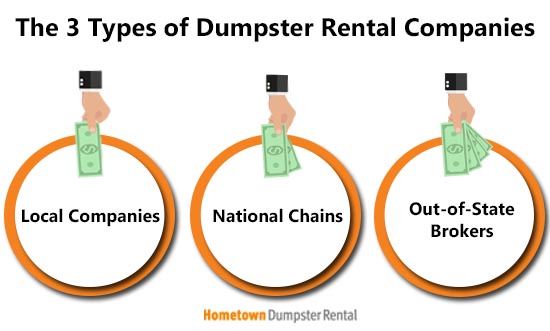
Local Companies
Independent, locally-owned and operated dumpster rental companies will almost always be the most affordable and personable service provider.
If the price point alone doesn’t seal the deal, then perhaps speaking with people in your area, who know the specific requirements of your city/township, will.
When you call for a quote, knowing the person you’re speaking with is familiar with your area can be the difference between unexpected permit fees or not.
National Chains
Large-scale waste management companies are typically more expensive than local companies while offering no additional benefits.
Why pay more to support a big brand when you can help your local economy by supporting a locally-owned business, and also save money?
Out-of-State Brokers
Dumpster rental brokers are third-party companies that book your service and take your payment, then hire a local company in your area to provide your booked service.
The most obvious downside to using this type of service is the additional cost you’re paying the broker to be the middleman between you and a company you could have hired independently.
Additionally, because you’re never communicating with the dumpster rental company directly, it is all too common that poor service and misunderstandings are the results of using a broker.
What’s Included in a Quote
When you call a local dumpster rental company for a quote, ask them whether their quotes are based on all-inclusive pricing or if they use variable pricing.
Variable pricing can fluctuate depending on the distance it takes to travel to your location, the type of debris or material you throw in the dumpster, and the total weight added to the dumpster.
Variable pricing can give you an advantage in the event that you have a large quantity of very lightweight material, but in most cases, it can be very difficult to estimate your final cost and only provides the opportunity to surprise you when you receive your final bill.
All-inclusive pricing is more commonly used and for this reason, we'll go into more detail.
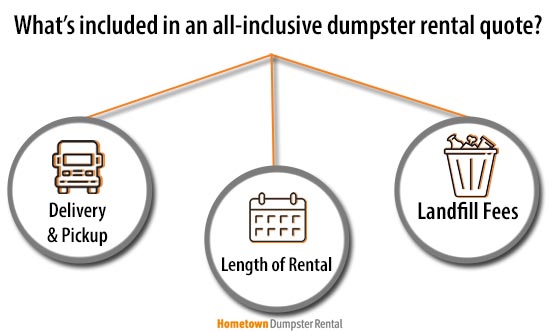
All-inclusive pricing includes...
Cost of Delivery
The cost of delivery includes fuel costs, labor, and making sure the dumpster is properly placed in the agreed-upon location.
Length of Rental
Most companies offer weekly and monthly rentals, and some will allow daily rentals depending on availability and the time of year.
That said, the average duration of a dumpster rental is one week, and that is typically the length included in the quoted price.
Make sure to have each company specify the length of their rentals.
Picking Up the Dumpster
The cost of fuel to travel back to your location, as well as the labor of loading the dumpster and hauling it away, is included in an all-inclusive pricing quote.
Disposal of Dumpster Contents
When you rent a dumpster, there are weight limitations that will affect the final cost you are billed if you exceed it.
A 10 yard dumpster usually allows for 2-3 tons, while a 40 yard dumpster can hold upwards of 8 tons.
Make sure to find out what the weight limits are when considering the pricing differences between competing local dumpster rental companies.
If you are not careful to make sure that you do not exceed your dumpster’s weight limit, you will be charged an overage fee.
Typically calculated by a specific dollar amount per ton over the limit, an overage fee can significantly increase the price you were originally quoted.
In many cases, exceeding your weight limit can end up costing you more than if you had ordered a larger dumpster in the first place.
Make sure to give as much detail as possible to the companies you speak with before choosing which dumpster size will suit your needs best.
Experienced professionals should be able to guide you in choosing the right dumpster size for your project.
Read more: Which Dumpster Size Should I Rent?
Factors That Affect the Final Price
Once you’ve compared quotes from your local dumpster rental companies and decide which provider you’d like to move forward with, it’s important to make sure that you understand the circumstances that can increase the price you ultimately pay.
Several factors can add additional costs to your dumpster rental bill...
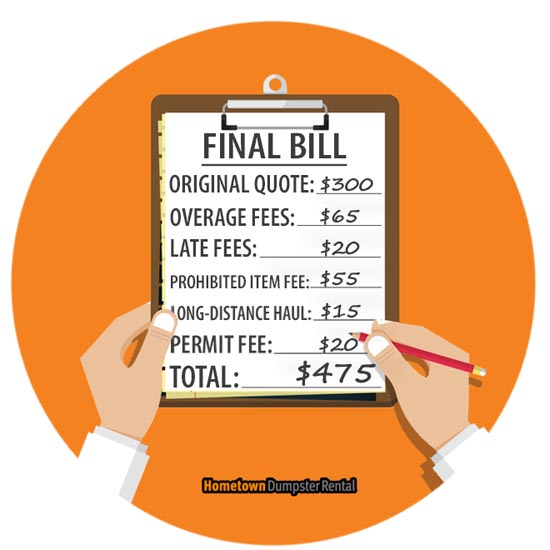
Overage Fees
As previously discussed, overage fees occur when the total weight of the contents you place in your dumpster rental exceeds the previously agreed upon weight limit.
On average, rental companies charge $50-$100 per ton over the weight allowance.
If you opt for a 10 yard dumpster because it's the cheapest option, but your contents weigh more than the weight allowance, you could end up paying more than if you had opted for a dumpster twice the size.
Late Fees
On average, rental companies will charge $10-$20 for each additional day that you keep the dumpster outside of your originally agreed upon rental period.
This fee doesn’t seem that high in the overall price you pay, but it is important to be aware of so that you aren’t surprised once you receive your final bill, as these fees can add up.
Penalties for Loading Prohibited Items
Every state and local municipality has its own rules and regulations regarding waste disposal.
These regulations are put in place to protect the environment and, if not followed, can result in fines and penalties.
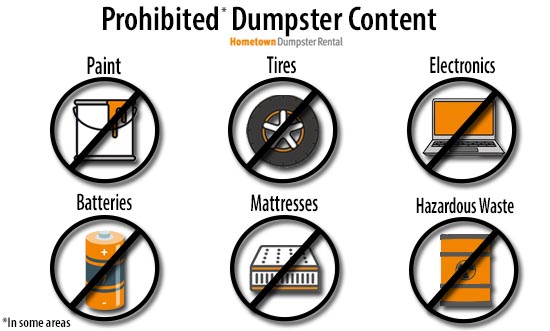
Depending on where you live, some examples of prohibited items include:
- Paint, stains, and lacquers
- Tires
- Electronics
- Batteries
- Mattresses
- Hazardous Waste (motor oil, asbestos, pesticides, household chemicals, etc.)
Long Distance Hauls
If you are located in a remote area that is outside of a company’s typical service area, you may be charged an additional fee to cover the fuel costs and additional time spent traveling.
Permits
If you need to have your dumpster placed on a public right-of-way, like a sidewalk, street, or city-owned property, you will need to obtain a permit from your local building permit office.
Some major cities also require permits if the dumpster is visible from the street.
In any case, it is always important to do the appropriate research for the requirements your property falls under.
In conclusion…
Dumpster rental quotes are pretty straightforward with reputable service providers.
As long as you are transparent with the scope of your project and understand the additional fees you’ll incur if your rental exceeds the agreed-upon terms, you should not be surprised on the day your final bill arrives.
Contact a dumpster rental service near you
Learn more about renting a dumpster:

